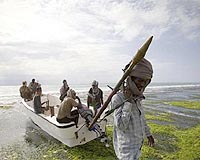| . |  |
. |
Kuala Lumpur (AFP) May 18, 2009 Officials from Somalia on Monday appealed for international help to establish a coastguard, saying it was the key to eradicating rampant piracy off the country's shores. Deputy Prime Minister Abdirahman Aden Ibbi said in a speech to an international conference that foreign naval patrols alone would not wipe out pirates who are disrupting one of the world's busiest maritime trade routes. "Somalia needs a more effective coastguard to protect its sea, to protect our fishermen and to protect foreign ships against piracy because international naval operations are not enough," he said. "We know where they hide. We are prepared to fight. We ask the international community to help us to fight piracy," he said in a speech read by Nur Mohamed Mohamoud, deputy director of Somalia's national security agency. Ibbi said that with a "massive increase in patrol boats and well-trained crew," Somalia could rid the world of the high-seas menace. A country of seven million people, Somalia has had no effective central government since former president Mohamed Siad Barre was ousted in 1991, setting off a bloody cycle of clashes between rival factions. Somali piracy started with more noble goals of deterring illegal fishing and protecting the nation's resources and sovereignty at a time when the state was collapsing. Today's pirates have morphed into a sophisticated criminal ring with international ramifications. Anti-piracy naval operations operating under US, European Union and NATO commands now patrol the region. Calls for more aggressive action have risen as attacks off Somalia and in the Gulf of Aden have escalated -- watchdogs say there have been 114 attempted hijackings so far this year, compared to 111 over the whole of 2008. Abdullah Said Samatar, security minister from the breakaway Somali state of Puntland which is a major piracy hub, backed the call to establish a coastguard and said he was disappointed that no help had been forthcoming. "We are fed up. We are frustrated," he told reporters at the conference, saying that with only two or three coastguard ships, the pirates could be eliminated. He welcomed the multinational naval task force currently patrolling the region, but ruled out suggestions that foreign militaries could be sent to storm pirate bases onshore. "On land, we only want local forces. Foreign forces cannot distinguish who is a fisherman or who are the pirates. They will create more problems for us," he said. Nicolaos Charalambous, deputy director of maritime security at the International Maritime Organisation, cast doubt on Somalia's ability to act against pirates even if it did receive funds for patrol boats. "In order to take any action against the pirates, the state must have a legal framework to prosecute the pirates before asking for the naval assets," he said. "If you are going to have a coastguard, you need fuel, manpower and to pay the salary of the staff. The question now is if Somalia is in any financial position to undertake this?" Richard Farrington, chief of staff of the EU Naval Force, said that while there are currently 25 warships patrolling the region, there would need to be 60 in the Gulf of Aden and 150 off Somalia to really tackle the problem. Experts at the two-day conference in the Malaysian capital are tackling divisive issues including who should pay for anti-piracy operations, and whether crews should be armed or mercenaries hired to guard ships. There is also a debate over what to do with pirates arrested by the navies patrolling the troubled region, and whether short-term security measures or longer-term development initiatives are the best way to curb high-seas crime. Ibbi said that Somalia, where the current transitional government is facing a serious challenge from Islamist insurgents, will not be able to eradicate piracy as long as it remains poor and ungoverned. "An end to piracy can only be brought if the rule of law can be enforced and causes of piracy tackled. Piracy will continue to be a problem as long as the violence continues in Somalia," he said. Share This Article With Planet Earth
Related Links 21st Century Pirates
 Arming sailors no answer to piracy menace: experts
Arming sailors no answer to piracy menace: expertsKuala Lumpur (AFP) May 18, 2009 Arming sailors or deploying mercenaries on board ships to combat pirate attacks would escalate violence and create a legal minefield, maritime experts and ship owners said Monday. Delegates at an international conference on piracy said the aggressive approach would create a high-seas "arms race", and recommended non-lethal measures like fire-hoses and electric barriers to prevent boarding. ... read more |
|
| The content herein, unless otherwise known to be public domain, are Copyright 1995-2009 - SpaceDaily. AFP and UPI Wire Stories are copyright Agence France-Presse and United Press International. ESA Portal Reports are copyright European Space Agency. All NASA sourced material is public domain. Additional copyrights may apply in whole or part to other bona fide parties. Advertising does not imply endorsement,agreement or approval of any opinions, statements or information provided by SpaceDaily on any Web page published or hosted by SpaceDaily. Privacy Statement |